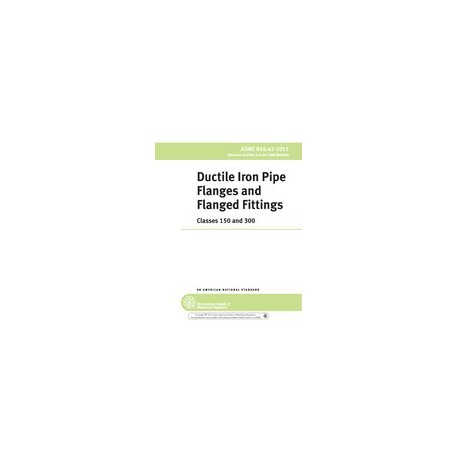No products
 View larger
View larger
ASME B16.42-2011
M00052714
New product
ASME B16.42-2011 Ductile Iron Pipe Flanges and Flanged Fittings, Classes 150 and 300
standard by ASME International, 11/28/2011
Full Description
This Standard covers minimum requirements for Class 150 and 300 cast ductile iron pipe flanges and flanged fittings. The requirements covered are as follows: (a) pressure-temperature ratings (b) sizes and method of designating openings of reducing fittings (c) marking (d) materials (e) dimensions and tolerances (f) bolts, nuts, and gaskets (g) tests.In stock
More info
Ductile Iron Pipe Flanges and Flanged Fittings
Classes 150 and 300
AN A MERICAN NA TIONAL S T AND ARD
ASME B16.42-2011
[Revision of ASME B16.42-1998 (R2006)]
ASME B16.42-2011
[Revision of ASME B16.42-1998 (R2006)]
Ductile Iron Pipe Flanges and Flanged Fittings
Classes 150 and 300
AN AMERICAN NA TIONAL S T AND ARD
Three Park Avenue • New York, NY • 10016 USA
Date of Issuance: November 28, 2011
The next edition of this Standard is scheduled for publication in 2016.
ASME issues written replies to inquiries concerning interpretations of technical aspects of this Standard. Periodically certain actions of the ASME B16 Committee may be published as Cases. Cases and interpretations are published on the ASME Web site under the Committee Pages at https://cstools.asme.org as they are issued, and will be published within the next edition of the standard.
ASME is the registered trademark of The American Society of Mechanical Engineers.
This code or standard was developed under procedures accredited as meeting the criteria for American National Standards. The Standards Committee that approved the code or standard was balanced to assure that individuals from competent and concerned interests have had an opportunity to participate. The proposed code or standard was made available for public review and comment that provides an opportunity for additional public input from industry, academia, regulatory agencies, and the public-at-large.
ASME does not “approve,” “rate,” or “endorse” any item, construction, proprietary device, or activity.
ASME does not take any position with respect to the validity of any patent rights asserted in connection with any items mentioned in this document, and does not undertake to insure anyone utilizing a standard against liability for infringement of any applicable letters patent, nor assumes any such liability. Users of a code or standard are expressly advised that determination of the validity of any such patent rights, and the risk of infringement of such rights, is entirely their own responsibility.
Participation by federal agency representative(s) or person(s) affiliated with industry is not to be interpreted as government or industry endorsement of this code or standard.
ASME accepts responsibility for only those interpretations of this document issued in accordance with the established ASME procedures and policies, which precludes the issuance of interpretations by individuals.
No part of this document may be reproduced in any form, in an electronic retrieval system or otherwise,
without the prior written permission of the publisher.
The American Society of Mechanical Engineers Three Park Avenue, New York, NY 10016-5990
Copyright © 2011 by
THE AMERICAN SOCIETY OF MECHANICAL ENGINEERS
All rights reserved Printed in U.S.A.
CONTENTS
Foreword iv
Committee Roster v
Correspondence With the B16 Committee vi
Summary of Changes vii
Scope 1
General 1
Pressure–Temperature Ratings 1
Size 2
Marking 2
Materials 3
Dimensions 3
Tolerances 5
Testing 5
Figures
Method of Designating Outlets of Reducing Fittings 6
Method of Designating Location of Tapped Holes for Drains When Specified 7
Tables
Pressure–Temperature Ratings 8
Reducing Threaded Flanges for Classes 150 and 300 9
Dimensions of Class 150 Elbows, Double Branch Elbows, Tees, Crosses, Laterals,
True Ys (Straight Sizes), and Reducers 10
Dimensions of Class 300 Elbows, Tees, Crosses, Laterals, True Ys (Straight Sizes),
and Reducers 12
Dimensions of Class 150 Base Elbows and Base Tees 14
Dimensions of Class 300 Base Elbows and Base Tees 15
Dimensions of Class 150 Ductile Iron Flanges 16
Templates for Drilling Class 150 Ductile Iron Flanges 17
Dimensions of Class 300 Ductile Iron Flanges 18
Templates for Drilling Class 300 Ductile Iron Flanges 20
I
Pressure–Temperature Ratings — Dimensions and Templates of Pipe Flanges
and Flanged Fittings in U.S. Customary Units ...................................
21
II
References ........................................................................
35
Mandatory Appendices
Nonmandatory Appendices
Quality System Program 36
Methods for Establishing Pressure–Temperature Ratings 37
iii

